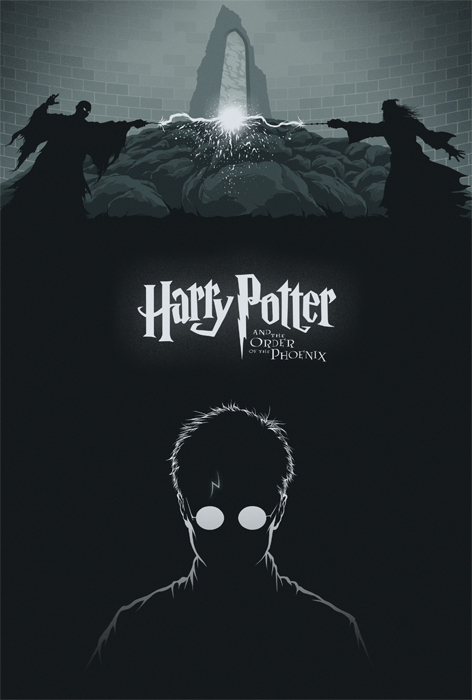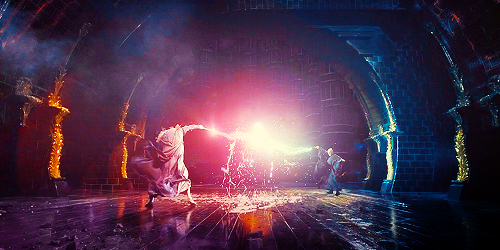Harry Potter and the Order of the Phoenix Film Review
Riddikulus: The 'Middle-Movie' Syndrome...
For sure, the events that were fleshed out in the previous film of The Goblet of Fire planted Harry, his friends and other significant characters into a new and dark scenario; a scenario which see's Lord Voldemort fully return to take plight onto the wizarding world and Harry, along with his friends, to try and stop this evil threat whilst learning new and secretive about his past along the way. The Order of the Phoenix is the catalyst of this; a film that subtly details Harry's unusual connection with Voldemort and expands it's own universe even further with new characters, new locations and events that will shape the fate of Harry. However, as intriguing, dark and serious as this may sound and appear, with loose exposition and lackadaisical tonal and contextual focus, this 5th Potter film outing is inconsistent and confusing to say the least being that the previous rendition foreshadowed the circumstances in an intriguing and hopeful way...
After returning to Hogwarts to begin his fifth year at the School of Witchcraft and Wizardry, Harry Potter discovers that much of the wizarding world, including the Ministry of Magic, is in denial about the return of Lord Voldemort. The Order of the Phoenix, a group to combat Voldemort and foe, is using its array of wizards and witches magical abilities to withstand the rise of Voldemort and his army of death-eaters. Cornelius Fudge, Minister for Magic, suspects Dumbledore is using these claims of the Dark Lord's return as a means to over-throw Fudge as Minister. In retaliation, a new Defence against the Dark Arts teacher is appointed by the Ministry in order to keep Hogwarts under 'control'. This new teacher, Professor Umbridge, implements these new and strict enforcement's to maintain order. As a full frontal reply, its up-to Harry's tutelage and with the help of Ron Weasley and Hermione Granger, to form a group known as Dumbledore's Army...
Even though I do have my reservations over The Order of the Phoenix's structural and tonal identity, it wouldn't be right of me if didn't mention the good points of the film as there some worthwhile aspects that I appreciated. The first factor that I liked that they kept in subtly, and yes I know I'm going to sound like a broken-record again, is this idea of isolation that Harry keeps getting himself into. While this idea of 'isolation' is applied to formal platforms in the previous Potter entries, like with The Prisoner of Azkaban where the continuous movement of the camera projects Harry's space to metaphorically show his lonely side and The Goblet of Fire where Harry is detached momentarily within the first act from Ron and Hermione, Order of the Phoenix takes a different angle with this theme and centres it, this time, with Harry's connection Dumbledore. The Order of the Phoenix is the first Potter film which roughly outlines the uncanny bond that Harry and Voldemort share with each other and with this being seen for the first time, where we see Harry having dreams of dark and mysterious happenings, unlocks this distant friendship that Harry has with Dumbledore. What is more intriguing is, while there are moments where Harry unsuccessfully tries to grab Dumbledore's attention at every opportune moment, this motif of 'isolation' can be applied to both of them together since they both get ridiculed and bad-rep from The Ministry of Magic who quash claims that Lord Voldemort has returned. One of the other themes that made itself known which the other previous films never had to explore, is this concept of Educational Empowerment and how The Ministry of Magic intervene to break the norm to conform their practises and educational decrees that Umbridge permits. Usually, Harry's resolving of the serious tasks that are thrown at him in the past have always had something to do with Voldemort, of course. Despite this being present in this film also, I did like how some elements were different with Harry's development since he not only has to fend off Voldemort like on other occasions, but he also has to put up with the educational and political onslaught that is put onto his feet and this was certainly refreshing to see.
As ever with every Harry Potter film that has been reviewed up to now, the performances from the mainstay's to the newcomers do a rather simple and effective job in embodying their own roles. The best of the bunch has to go to Imelda Staunton for her performance as Dolores Umbridge; a vile and rather quirky adversary to Hogwarts school who leaves a mark on a conflicting film. Out of characters that come and go from this lauded franchise, Umbridge is someone that is fully-realised and straight to the point with her ironic clothing and aurora of pink despite her being a mish-mash of the wicked witch and Susan Boyle. Even though she doesn't get enough screen time that she deserves, although does make her self-known i the later films, is Evanna Lynch's enactment as Luna Lovegood, a character that is abnormal and different. They honestly couldn't find anyone else to play this quirky female than Evanna Lynch who was known at the time of this films release, to be a fan of the books and the stories. Like with the previous films as well, the usual suspects of Rickman, Gambon and the rest of the adult class that take up the Harry Potter character list do exceptionally fine and simple jobs. My only complaint, on occasions, would be the poor line delivery that the secondary characters acted out. It's hard to tell whether to blame the writing or the acting on this, but there a few moments when characters, such as Ginny Weasley and Tonks (although she only say's a few lines in the whole entirety), aren't enthusiastic to the moment that these characters are placed in.
Horrific mystery. This is something that previous Harry Potter films have aimed to deliver in their own way. With David Yates' first take on Potter, with The Order of the Phoenix, this is certainly something that is missing since we are burden with loose exposition and moulded structuring that weighs down some of the better aspects of this film. It's understandable from Yates' point of view, being that he's translating a source materiel that is lengthy exposition heavy. Commendable as it is seeing a shorter Harry Potter film, The Order of the Phoenix overall felt oddly rushed and long with the amount of story elements that had to be told. Surely, The Half-Blood Prince can go back to the norm, rather than present something that is reminiscent, of the 'Middle-Movie' Syndrome...
On that note, it's time for me to end. As always everyone, thank you for reading my latest film review and I hope you've enjoyed the read. If anyone has an opinion on either my review or the film, please feel free to drop a comment down below. Next week, I will bring you a film review of a Japanese animated film that certainly goes near the top of the list as being one of the best, and it isn't a Studio Ghibli film! Until then, I want to thank you again for checking out my latest review and I'll see you all next week!! Have a nice day and weekend!! Adieu!! :)
6/10 - Alex Rabbitte.
(I wish this was longer and better as well...)



Comments
Post a Comment